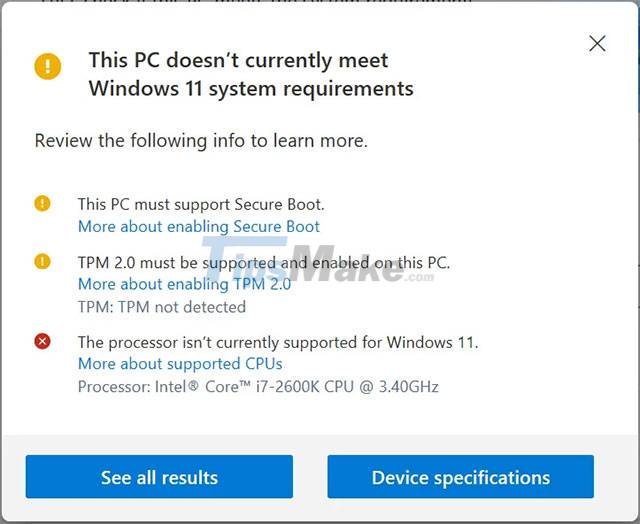Users who install Windows 11 on incompatible devices may not receive support from Microsoft
Microsoft seems to be turning a blind eye to a 'flaw' that allows users to install Windows 11 on incompatible hardware systems. In recent times, there have been many documented reports of Windows 11 still running (unofficially) on systems that do not meet the hardware requirements from Microsoft.
But of course things can't go so smoothly. Windows developers have just issued a warning that Windows 11 users on unsupported systems may not be entitled to periodic, or otherwise unsupported, security updates from Microsoft.
Since officially announcing Windows 11, Microsoft has emphasized the necessary requirements that a system must strictly adhere to in order to install a new operating system. However, the main problem lies in the requirements for TPM 2.0 processors and new generation CPUs. This leaves a large number of Windows 10 users on hardware systems that are not too old, but still stuck, unable to upgrade to Windows 11, unless they accept to spend quite a bit more money to upgrade hardware (related to Windows 10). related to CPU and mainboard).
As a simple example, this list of hardware incompatible with Windows includes devices using Intel 7th Gen CPUs and AMD Zen 1. The only exception is the 7th Gen Intel Core 7820HQ CPU, which is the processor used on Microsoft Surface Studio 2 devices. These are obviously hardware components that are not too old, and are still in common use.

In response to a rather harsh response from the user community, Microsoft recently announced that users of older hardware systems can completely bypass the TPM 2.0 requirement by performing a clean install of Windows 11 using the Media Creation Tool. or ISO file.
However, users will still need to have at least a TPM 1.2 security processor, and using this method will leave the PC in an unsupported state as outlined above.
Microsoft hasn't said why it's making such a policy, but it's most likely to allow a trial to install and experience Windows 11 on test devices.
Loopholes come with risks
Microsoft has stated that Windows 11 devices in an unsupported state will not receive new updates through Windows Update. This may include driver and security related updates. This will obviously lead to a huge security risk, especially as zero-day vulnerabilities exploited by cybercriminals are increasingly common.
In other words, Microsoft allows users to install and use 'underground' Windows 11 on hardware systems that do not meet the minimum requirements, but at the same time will leave them alone by not providing updates. , patch required.
It is not clear if users can manually install updates through the Microsoft Update Catalog. And if possible, Microsoft's controversial policy above will no longer be such a big deal.
On the other hand, if Microsoft also blocked manual updates, there would be nothing more to say!
You should read it
- ★ Minimum configuration for running Windows 10
- ★ Microsoft continues to raise hardware requirements Windows 11: Requires 8th generation Intel chip, Ryzen 2000 or later
- ★ Microsoft will change incompatible driver handling on Windows 10
- ★ Mortal Kombat 1 PC configuration will require more than 100GB of free space?
- ★ Minimum configuration to run Android apps on Windows 11